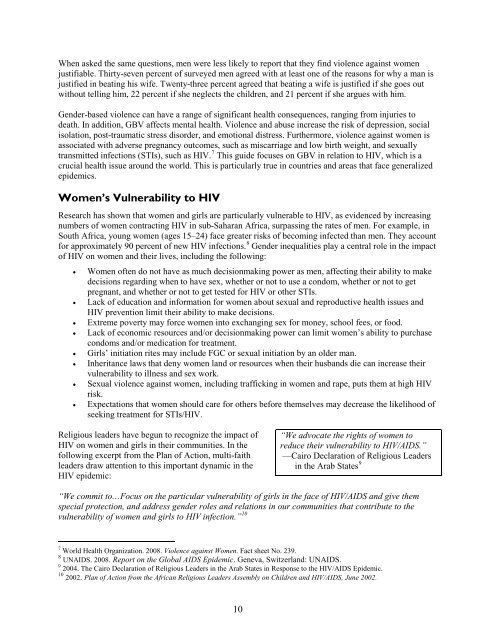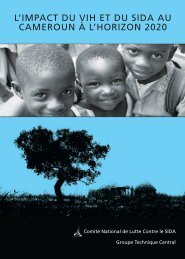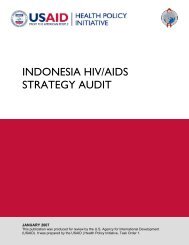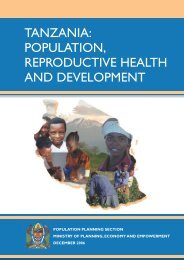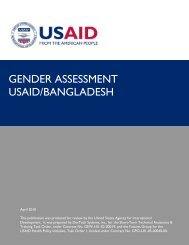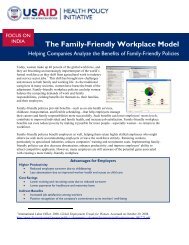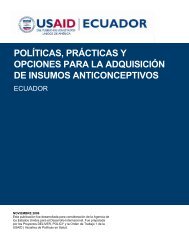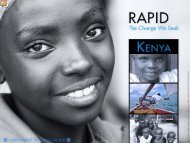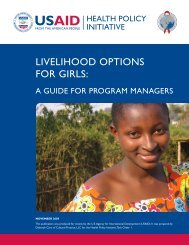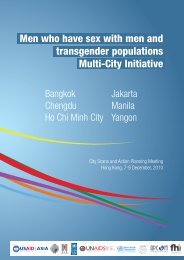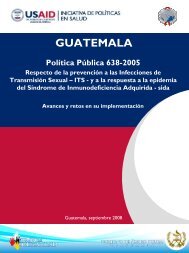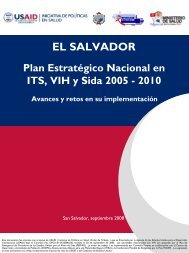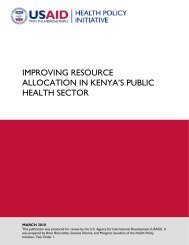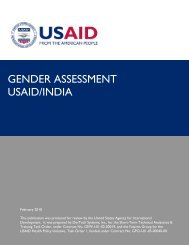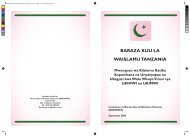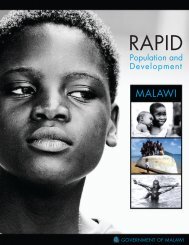A Call to Act - Health Policy Initiative
A Call to Act - Health Policy Initiative
A Call to Act - Health Policy Initiative
Create successful ePaper yourself
Turn your PDF publications into a flip-book with our unique Google optimized e-Paper software.
When asked the same questions, men were less likely <strong>to</strong> report that they find violence against women<br />
justifiable. Thirty-seven percent of surveyed men agreed with at least one of the reasons for why a man is<br />
justified in beating his wife. Twenty-three percent agreed that beating a wife is justified if she goes out<br />
without telling him, 22 percent if she neglects the children, and 21 percent if she argues with him.<br />
Gender-based violence can have a range of significant health consequences, ranging from injuries <strong>to</strong><br />
death. In addition, GBV affects mental health. Violence and abuse increase the risk of depression, social<br />
isolation, post-traumatic stress disorder, and emotional distress. Furthermore, violence against women is<br />
associated with adverse pregnancy outcomes, such as miscarriage and low birth weight, and sexually<br />
transmitted infections (STIs), such as HIV. 7 This guide focuses on GBV in relation <strong>to</strong> HIV, which is a<br />
crucial health issue around the world. This is particularly true in countries and areas that face generalized<br />
epidemics.<br />
Women’s Vulnerability <strong>to</strong> HIV<br />
Research has shown that women and girls are particularly vulnerable <strong>to</strong> HIV, as evidenced by increasing<br />
numbers of women contracting HIV in sub-Saharan Africa, surpassing the rates of men. For example, in<br />
South Africa, young women (ages 15–24) face greater risks of becoming infected than men. They account<br />
for approximately 90 percent of new HIV infections. 8 Gender inequalities play a central role in the impact<br />
of HIV on women and their lives, including the following:<br />
• Women often do not have as much decisionmaking power as men, affecting their ability <strong>to</strong> make<br />
decisions regarding when <strong>to</strong> have sex, whether or not <strong>to</strong> use a condom, whether or not <strong>to</strong> get<br />
pregnant, and whether or not <strong>to</strong> get tested for HIV or other STIs.<br />
• Lack of education and information for women about sexual and reproductive health issues and<br />
HIV prevention limit their ability <strong>to</strong> make decisions.<br />
• Extreme poverty may force women in<strong>to</strong> exchanging sex for money, school fees, or food.<br />
• Lack of economic resources and/or decisionmaking power can limit women’s ability <strong>to</strong> purchase<br />
condoms and/or medication for treatment.<br />
• Girls’ initiation rites may include FGC or sexual initiation by an older man.<br />
• Inheritance laws that deny women land or resources when their husbands die can increase their<br />
vulnerability <strong>to</strong> illness and sex work.<br />
• Sexual violence against women, including trafficking in women and rape, puts them at high HIV<br />
risk.<br />
• Expectations that women should care for others before themselves may decrease the likelihood of<br />
seeking treatment for STIs/HIV.<br />
Religious leaders have begun <strong>to</strong> recognize the impact of “We advocate the rights of women <strong>to</strong><br />
HIV on women and girls in their communities. In the<br />
reduce their vulnerability <strong>to</strong> HIV/AIDS.”<br />
following excerpt from the Plan of <strong>Act</strong>ion, multi-faith<br />
—Cairo Declaration of Religious Leaders<br />
leaders draw attention <strong>to</strong> this important dynamic in the in the Arab States 9<br />
HIV epidemic:<br />
“We commit <strong>to</strong>…Focus on the particular vulnerability of girls in the face of HIV/AIDS and give them<br />
special protection, and address gender roles and relations in our communities that contribute <strong>to</strong> the<br />
vulnerability of women and girls <strong>to</strong> HIV infection.” 10<br />
7 World <strong>Health</strong> Organization. 2008. Violence against Women. Fact sheet No. 239.<br />
8 UNAIDS. 2008. Report on the Global AIDS Epidemic. Geneva, Switzerland: UNAIDS.<br />
9 2004. The Cairo Declaration of Religious Leaders in the Arab States in Response <strong>to</strong> the HIV/AIDS Epidemic.<br />
10 2002. Plan of <strong>Act</strong>ion from the African Religious Leaders Assembly on Children and HIV/AIDS, June 2002.<br />
10


